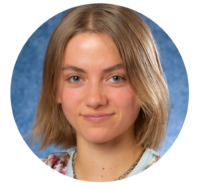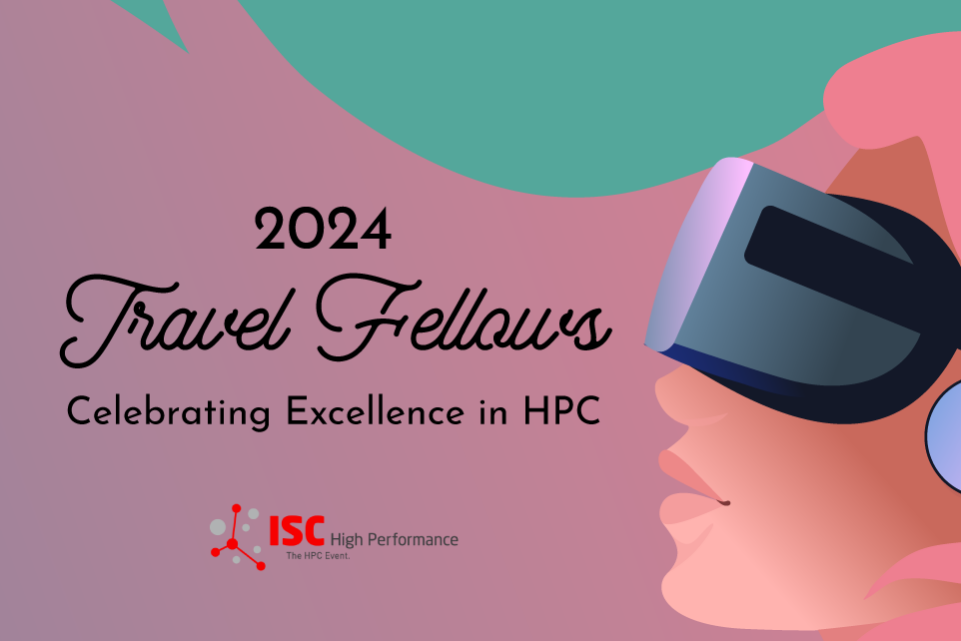This 2024 Travel Fellowship is made possible thanks to Do IT Now, the WHPC ISC24 Supporters, and the work of our WHPC ISC24 Volunteers Committee.
Thanks to the generosity of WHPC Champion, Do IT Now, coupled with the invaluable contributions from our dedicated sponsors and our collaborative partnership with ISC24, the WHPC Executive Committee and WHPC ISC24 Volunteers Committee are pleased to announce the award of our travel fellowships to two exceptional Early Career speakers.
Both of these women represent the best of our emerging talent within the supercomputing field and we are excited to have them present their work this year in Germany. Their work will be featured at the ISC24 WHPC Poster Session and you can hear their extended Lightning Talks at the WHPC Solution Forum Takeover on May 13, 2024.
Our honoured recipients are:
Shraddha Mahesh Thanki
“As a proponent of increasing female participation in STEM, I am dedicated to using my journey to inspire and motivate others.” – Shraddha Mahesh Thanki
 Shraddha Mahesh Thanki is a student specializing in High-Performance Computing (HPC) and Quantum Computing at the Deggendorf Institute of Technology, Germany. With a strong foundation in computer science through both a Bachelor’s and a Master’s degree, her focus is on using technology to address real-world challenges.
Shraddha Mahesh Thanki is a student specializing in High-Performance Computing (HPC) and Quantum Computing at the Deggendorf Institute of Technology, Germany. With a strong foundation in computer science through both a Bachelor’s and a Master’s degree, her focus is on using technology to address real-world challenges.
Shraddha’s experience as a System Engineer at Tata Consultancy Services (TCS) provided her with practical skills in developing web and software solutions, using technologies such as Java, WebLogic, and Angular. These projects emphasized the importance of teamwork and technical proficiency.
Her academic projects, including a software solution for loan applications and an Android chatbot, demonstrate her ability to apply technical knowledge creatively and effectively. These experiences have sharpened Shraddha’s problem-solving skills and commitment to technological innovation.
Shraddha has also been recognized for her work in quantum computing, specifically a project that applied this technology to study fluid dynamics. This acknowledgment from Intel underscores her interest in contributing to important areas such as environmental science and aerospace engineering.
Shraddha will be presenting, “The Quantum Lattice Boltzmann Method in Intel Quantum SDK” at the WHPC Poster Session, as well as appearing at the WHPC Solution Forum Takeover at ISC24. Here is a peek at her abstract:
Generally, Partial Differential Equations (PDEs) are used in describing physical processes e.g. Fluid Flow. PDEs can be transformed into algebraic equations and then using computers to solve them. The algebraic equations transformed into their discrete counterparts are calculated at each computational point. The more complex the physical system, the larger the dimensionality of the algebraic equations, the more computational power required. It seems that Quantum Computers could help us solve this problem. We have tried and implemented a simple 1-dimensional, 2-Dimensional, and 3-Dimensional advection-diffusion equation using the Quantum Lattice Boltzmann Method (LBM) algorithm in the Intel Quantum Software Development Kit (SDK). The highlight of this work is to involve quantum Walk.
Phoebe Cullen
“As an explorer at the crossroads of life and physical sciences, I am driven by the potential of high-performance computing to unravel the intricate dance of molecules within living systems.” – Phoebe Cullen
 Phoebe is a fourth year MNatSc BSc Natural Sciences undergraduate at the University of Leeds, UK, currently undertaking a year-long industrial placement within STFC Scientific Computing at the Science and Technology Facilities Council’s (STFC) Daresbury Laboratory. Reading Physics, Biology and Mathematics, Phoebe is especially interested in the intersection between life and physical sciences. Her current project at STFC is focused on improving the quality of mesh-based methods used in large biosimulations, using the power of HPC to enhance global understanding of the complex intracellular mechanisms that are fundamental for life. Phoebe is developing a parallel, proof-of-concept Algorithm with a goal to aid the modelling of protein-protein interactions. Currently, this Algorithm is being implemented into the open-source, massively parallel, multi-physics software, code_saturne, to allow for large simulations at the mesoscale, modelling many proteins, as well as highly complex molecules beyond the current capabilities of the popular atom-based approach of Molecular Dynamics.
Phoebe is a fourth year MNatSc BSc Natural Sciences undergraduate at the University of Leeds, UK, currently undertaking a year-long industrial placement within STFC Scientific Computing at the Science and Technology Facilities Council’s (STFC) Daresbury Laboratory. Reading Physics, Biology and Mathematics, Phoebe is especially interested in the intersection between life and physical sciences. Her current project at STFC is focused on improving the quality of mesh-based methods used in large biosimulations, using the power of HPC to enhance global understanding of the complex intracellular mechanisms that are fundamental for life. Phoebe is developing a parallel, proof-of-concept Algorithm with a goal to aid the modelling of protein-protein interactions. Currently, this Algorithm is being implemented into the open-source, massively parallel, multi-physics software, code_saturne, to allow for large simulations at the mesoscale, modelling many proteins, as well as highly complex molecules beyond the current capabilities of the popular atom-based approach of Molecular Dynamics.
Phoebe will be presenting, “Developing a Parallel Algorithm to Simulate the Merging of Proteins Using a Mesh-based Approach” at the WHPC Poster Session, as well as appearing at the WHPC Solution Forum Takeover at ISC24. Here is a peek at her abstract:
Biomolecular simulations are crucial to understanding the complex and highly dynamic environments within biological cells. A popular approach relies on Molecular Dynamics (MD), which employs Newtonian mechanics force fields to compute atomic coordinates over short time steps. Biosimulations work in conjunction with imaging techniques, providing dynamic information to relate static experimental structures to biological function [1]. X-ray Crystallography is a widely used method, though in 50 years of work, it has only been possible to image 18% of biological structures present in cells, due to difficulty crystallising biomolecules with large molecular weights. An alternative technique, Cryo-Electron Microscopy (cryo-EM) overcomes this issue, allowing much larger structures to be described.
In the next decade, it should be possible to image around 50% of subcellular structures. However, these larger length scales are beyond the capabilities of MD, as they would be many thousands of times too computationally expensive to compute such vast molecules atom-by-atom, even with High Performance Computing. Therefore, multi-scale multi-physics methods are required. For larger length scales, continuum mechanics is proposed for use in a coarse-grained approach. Fluctuating Finite Element Analysis (FFEA) is a method primarily developed at the University of Leeds which uses meshes in place of atomic coordinates, therefore lending itself to data produced by cryo-EM [2].
With MD, scientists can currently study phenomena such as protein folding and molecular recognition. Modelling macromolecules at a larger scale, and exploring how they interact, will be the next step, helping to decipher the complex bio-machinery within cells. However, there are around 40 million proteins in a single cell, thus, even if only a small percentage interact, the computational demands still exceed the capabilities of serial programming, highlighting the need for massively parallel computing.
This poster presents a mesh merging procedure that will be used to simulate protein-protein merging – one form of interaction, where two or more distinct proteins combine into one body. A methodology is proposed, whereby selected subsurfaces of two meshes are projected up to some defined plane, extruded, and then finally merged. The current developments are detailed, with techniques used to perform each stage explained, and a plan for future work is summarised. The described algorithm will next be incorporated into code_saturne [3], a multi-physics Computational Engineering code, due to the software’s massively parallel capabilities.
The wider aim is to build a toolkit of algorithms to simulate the different protein interactions that occur in cells. It is hoped that these novel techniques will help to improve the predictive power of biosimulation, bridging the gap between molecular and clinical studies and helping to reduce costs of drug research.
[1] Edwards et al., 2021. doi: 10.1107/S2059798321009712 [2] Solernou et al., 2018. doi: 10.1371/journal.pcbi.1005897 [3] Fournier et al., 2011. doi: 10.1016/j.compfluid.2011.01.028
How our Travel Fellowships were decided
This fellowship was extended to all those who successfully applied to present their posters at the WHPC Poster Session being held from May 13th to May 15th, 2024. Presenters were required to submit both a stellar poster and personal statement in order for consideration. In the interest of fairness all reviews for the fellowship were blind. Each of our award winners will receive up to £3,000 towards travel and conference expenses, which will be reimbursed after the conference comes to a close.
About WHPC Champion, Do IT Now
 The Do IT Now Alliance (https://doit-now.tech/) has been founded to deliver a higher level of High-Performance Computing services. We are market leaders and offer the best solutions to our clients. We share a passion and enthusiasm for facing new challenges of HPC technologies together. Do IT Now deals with the complexity of HPC providing simple solutions to scientists and engineers.
The Do IT Now Alliance (https://doit-now.tech/) has been founded to deliver a higher level of High-Performance Computing services. We are market leaders and offer the best solutions to our clients. We share a passion and enthusiasm for facing new challenges of HPC technologies together. Do IT Now deals with the complexity of HPC providing simple solutions to scientists and engineers.
The added value we offer is a deep understanding of the most advanced technologies in HPC,along with high quality customer and user support. We offer solutions for different IT sectors like Big Data, artificial intelligence (AI), cloud computing or storage.
Special Thanks to WHPC Supporters
We’d also like to extend deep appreciation to all of this year’s ISC24 Supporters. Thanks to their generous contributions we will have a host of additional activities and giveaways to share with all those attending ISC24 in-person in Hamburg, Germany!
If your institution is interested in contributing to future WHPC events please contact us at info@womeninhpc.org.

